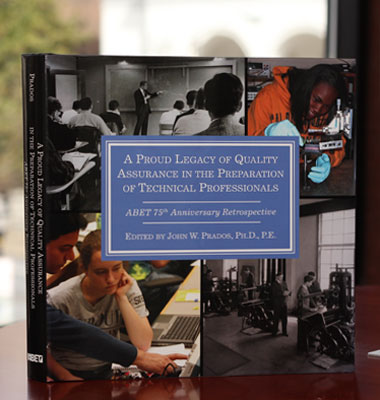History
Founding
We were founded in 1932 as the Engineers’ Council for Professional Development (ECPD), an engineering professional body dedicated to the education, accreditation, regulation and professional development of engineering professionals and students in the United States.
At its founding, ECPD was headquartered in New York City, first at the Engineering Societies Building and then the United Engineering Center. We relocated to Baltimore, Maryland, in 1996.
A New Name And Expanded Focus
In 1980, ECPD was renamed the Accreditation Board for Engineering and Technology (ABET) to more accurately describe our emphasis on accreditation.
In response to the anticipated boom in computer science education, ABET helped establish the Computing Sciences Accreditation Board (now called CSAB) in 1985. At its merger with ABET in the early 2000s, CSAB became one of our largest member societies, with more than 300 accredited programs.
In 2005, we began operating and doing business under the acronym ABET (ABET, pronounced “A-bet”), using “Accreditation Board for Engineering and Technology, Inc.” as our corporate name only when required by law.
As the world’s leading accreditation body for programs in applied and natural science, computing, engineering and engineering technology. ABET’s scope has grown beyond its original engineering and technology focus. Our community now includes educators, industry leaders, government officials and students from diverse disciplines.
For this reason, the organization is now exclusively referred to as ABET, reflecting our broad and inclusive mission to assure quality and stimulate innovation in technical education globally.
Licensure
From the very start, our educational standards have served as the basis of quality against which professional engineers are held for licensure. After over 80 years of refining our processes, programs accredited by the Engineering Accreditation Commission (EAC) remain the benchmark for the engineering professions.
Member Societies
From the start, our activities were driven by the professions we serve. Today, 34 member societies provide experts and set the standards for the ABET accreditation process. In 1932, seven engineering societies founded the organization and contributed to ECPD’s original direction and focus:
- American Society of Civil Engineers (ASCE)
- American Institute of Mining and Metallurgical Engineers, now the American Institute of Mining, Metallurgical, and Petroleum Engineers (AIME)
- American Society of Mechanical Engineers (ASME)
- American Institute of Electrical Engineers (now IEEE)
- Society for the Promotion of Engineering Education, now the American Society for Engineering Education (ASEE)
- American Institute of Chemical Engineers (AIChE)
- National Council of State Boards of Engineering Examiners (now NCEES)
In 1936, ECPD evaluated its first engineering degree programs. Ten years later, the council began evaluating engineering technology degree programs. By 1947, ECPD had accredited 580 undergraduate engineering programs at 133 institutions.
Producing guidance and training publications was a large part of ECPD operations. The council produced dozens of books, pamphlets, brochures, and movies—among them:
- Reading List for Junior Engineers (1945)
- Speaking Can be Easy… for Engineers Too (1950)
- WOMENGINEER (1974)
- Minorities in Engineering (1974)
Becoming a Global Accreditation Leader
Our international activities began in 1979, when ECPD signed its first Mutual Recognition Agreement with the Canadian Engineering Accreditation Board. By the early 1990s, we served as consultants to both fledgling and established international accreditation boards, a substantial equivalence evaluator of international programs and a founding member of the multinational Washington Accord.
Engineering Criteria 2000 and Program Innovation
In 1997, following nearly a decade of development, we adopted Engineering Criteria 2000 (EC2000), considered at the time a revolutionary approach to accreditation criteria. EC2000 focused on outcomes (what is learned) rather than what is taught. At its core, EC2000 affirmed the importance of institutions establishing clear objectives and assessment processes to ensure that each program provides graduates with the technical and professional skills employers demand.
By eliminating the inflexibility of earlier accreditation criteria, EC2000 allowed us to empower program innovation rather than stifling it, as well as encourage new assessment processes and subsequent program improvement.
Today, the spirit of EC2000 can be found in the evaluation criteria of all our disciplines, and studies like Penn State’s Engineering Change prove those criteria are having a positive impact on ABET-accredited programs and graduates who have such essential 21st century skills as the ability to work in teams and communicate effectively.
We continue to work globally to promote the EC2000 perspective with other accreditation boards and in other degree program areas. We also promote global education and career mobility through Mutual Recognition Agreements, such as the Washington Accord, the Seoul Accord, the Sydney Accord and the Dublin Accord.
ABET Today
Currently, we accredit 4,773 programs at 930 colleges and universities in 42 countries. Each year, over 2,200 volunteers from 34 member societies contribute to ABET’s goal of assuring confidence in applied and natural science, computing, engineering and engineering technology education, serving as program evaluators, committee and council members, commissioners and members of our Board of Directors.
Past Presidents of ABET
